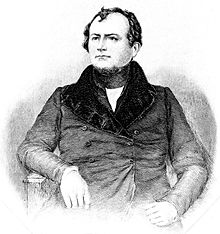Thomas Wilson Dorr
| Thomas Wilson Dorr | |
|---|---|
 |
|
| 16th Governor of Rhode Island (extralegal) |
|
|
In office May 1, 1842 – January 23, 1843 Along with Samuel Ward King |
|
| Lieutenant | Byron Diman |
| Preceded by | Samuel Ward King |
| Succeeded by | Samuel Ward King |
| Personal details | |
| Born | November 5, 1805 Providence, Rhode Island |
| Died | December 27, 1854 (aged 49) |
| Resting place | Swan Point Cemetery, Providence, Rhode Island |
| Signature | |
Thomas Wilson Dorr (November 5, 1805 – December 27, 1854), was an American politician and reformer in Rhode Island, best known for leading the Dorr Rebellion, an effort to broaden the franchise in the state for white males and to change apportionment in the legislature for better representation of urban populations.
Thomas Wilson Dorr was born in Providence, Rhode Island, the son of Sullivan and Lydia (Allen) Dorr. His father was a prosperous manufacturer and co-owner of Bernon Mill Village. Dorr's family occupied a good social position. He had sisters and other siblings.
As a boy, he attended Phillips Exeter Academy. After graduating from Harvard College in 1823, he went to New York City, where he studied law under Chancellor James Kent and Vice-Chancellor William McCoun. He was admitted to the bar in 1827 and returned to Providence to practice.
Thomas Dorr never married, but two of his sisters wed prominent men. One of his nephews married a daughter of John Lothrop Motley. .
Dorr began his political career when elected as a representative in the Rhode Island General Assembly in 1834. He became concerned about issues of the franchise: white men who were not allowed to vote because they did not own a certain value of real estate, and the dominance of rural interests in the state legislature, where seats were apportioned by geographic jurisdictions, with all towns being treated as equal.
In the half-century following the American Revolution, some activists worked to expand the franchise, often by reducing property or similar requirements. In Rhode Island such attempts were made at intervals from 1797 to 1834, but had invariably been obstructed by the state government. In 1834 a convention met at the capital of Providence to consider the matter again. Dorr was a member of the committee which drew up an address to the people. All efforts at reform, however, were blocked again by the legislature, dominated by rural interests. Its apportionment resulted in an under-representation of the growing urban populations in the industrializing cities.
...
Wikipedia
